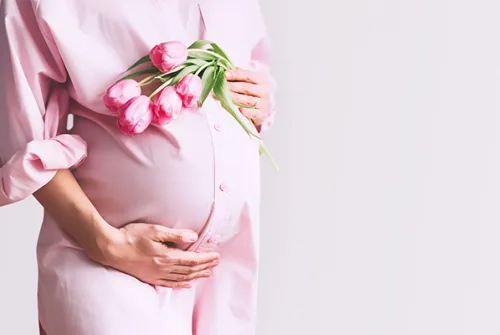Alo Yeditepe
Alo Yeditepe
Pregnancy Cholestasis
Pregnancy cholestasis is the discomfort experienced especially towards the third trimester. So, what are the symptoms of gestational cholestasis? How is diagnosed? Yeditepe University Kozyatağı Hospital Gynecology and Obstetrics Specialist Op. Dr. Yosun Görkem Zeybek Özçer talked about pregnancy cholestasis...
Some pregnant women may experience severe itching during their third trimester of pregnancy. The cause of this severe itching is cholestasis, a disease of the liver during pregnancy. So, what are the symptoms of gestational cholestasis? Does pregnancy cholestasis harm the baby? What is done in the treatment of gestational cholestasis? Can people with cholestasis give birth normally? Yeditepe University Koşuyolu Hospital Gynecology and Obstetrics Specialist Op. Dr. Yosun Görkem Zeybek Özçer talked about the concerns about gestational cholestasis...
What is Pregnancy Cholestasis?
Pregnancy cholestasis is a disease characterized by itching that gradually increases and spreads without a rash on the skin that occurs in the last months of pregnancy. In fact, itching can be seen in about a quarter of pregnancies, but in gestational cholestasis, the liver cannot adequately perform the function of removing bile acids from circulation. These substances accumulate in the blood and liver causing increasing itching and other signs of the disease. This condition, which quickly improves after birth, causes stubborn itching in the mother during pregnancy, and very rarely complications such as preeclampsia (pregnancy poisoning), gestational sugar, and postpartum bleeding. However, it is riskier for the baby. There may be premature birth, distress of the baby in the womb, pooping, respiratory distress after birth, and even loss of the baby. Close follow-up and appropriate delivery timing are necessary to prevent all these complications.
What are the Causes of Pregnancy Cholestasis?
Causes of gestational cholestasis include genetic mutations that affect bile secretion, increased hormone levels in the last months of pregnancy, and environmental factors. There is an increased risk of gestational cholestasis in pre-existing liver diseases.
Who Has Pregnancy Cholestasis? What Are the Risk Factors?
Pregnancy cholestasis history in first-degree relatives such as mothers and siblings, multiple pregnancies, and in vitro fertilization are among the known risk factors for the presence of liver disease before pregnancy. The disease has also been linked to vitamin D, selenium deficiency, and cold exposure. The prevalence of gestational cholestasis in eight out of a thousand pregnant women in our country is similar in Europe, Asia, and North America.
What are the Symptoms of Pregnancy Cholestasis? When does it Commence?
Itching, which is the first and most prominent symptom in gestational cholestasis, is usually seen in the 30th week of pregnancy. The itching that starts in the hands and feet increases in proportion to the increased bile acids in the blood and spreads throughout the body within days and weeks.
Increased itching at night can cause insomnia, impaired quality of life, loss of appetite, weakness, and psychological problems. Fever, skin rash, and redness are not initially seen in gestational cholestasis. However, scratches and injuries on the skin as a result of constant scratching can cause infection, redness, and scarring.
Some patients may develop jaundice, lightening of stool color, and darkening of urine color. However, when symptoms such as abdominal pain and clouding of consciousness are observed, other underlying diseases should be investigated.
Does Pregnancy Cholestasis Harm the Baby?
In gestational cholestasis, bile acids with increased levels in maternal blood are passed to the baby through the placenta. Increased bile acids accumulate in the baby's lungs, heart muscle, intestine, and amniotic fluid. As a result, pooping while in the womb, irregularity in the baby's heartbeat, and sudden cardiac arrest may develop. Even in babies with normal follow-up, the accumulation of bile acids in the lungs may cause respiratory failure in the baby after birth. Unfortunately, the disease with itching in the mother carries life risks for the baby. Therefore, early diagnosis and effective treatment of the disease are very important.
How to Diagnose Pregnancy Cholestasis?
After a detailed physical examination, blood tests are performed on pregnant women who apply with the itching for diagnosis after excluding other causes. The follow-up and treatment plan of the pregnant woman is created according to liver function tests, vitamin K, coagulation tests, and bile acid levels. In some cases, blood values may rise days or weeks after the itching begins. In these cases, the examinations may need to be repeated.
What is Done in the Treatment of Gestational Cholestasis?
Treatment aims to both soothe the mother's complaints and protect the baby from possible complications. Itching is tried to be controlled with creams and cold applications. Reducing the level of bile acids is achieved with bile-binding pills developed for this purpose. In addition, vitamin support should be provided as the absorption of fat-soluble vitamins is reduced. Unfortunately, studies have shown that the treatments given are effective in relieving the mother's complaints, but do not reduce the risks for the baby. Even in pregnancies where itching regresses and blood values decrease, it may be possible to put the time of birth forward as complications of the baby are observed. In order to understand that the baby is in distress in the womb, the frequency of control is increased. Follow-up of infant movements, NST, and doppler ultrasonography measuring infant blood flow, liver enzymes, and bile acid levels are checked.
National and international guidelines recommend that pregnant women diagnosed with gestational cholestasis be delivered 3 to 5 weeks earlier than the expected date of birth, depending on the severity of the disease. The birth should be carried out at the most appropriate time when the development of the baby is completed by ensuring that the baby is at least affected by the disease in the womb. The timing of delivery should be evaluated by the gynecologist and planned individually.
Can People with Cholestasis Give Vaginal Delivery?
Since there is a risk of loss in the mother's womb in gestational cholestasis, labor pains are not expected to start naturally. Although the timing of delivery is made by the doctor, the type of delivery may be the joint decision of the mother and the obstetrician.
When the delivery decision is made, along with taking the necessary precautions, a cesarean section can be planned and normal birth can be started by inducing. However, it should be kept in mind that emergency intervention and cesarean section may be required at any time during normal birth follow-up. Regardless of the type of delivery, postpartum follow-up of the baby should be carried out in centers with sufficient equipment and experience in neonatal care. After birth, the mother's blood values quickly return to normal and her complaints regress, treatment is discontinued, so there is no harm in breastfeeding the baby. However, if the complaints continue in the mother, it is beneficial to refer the blood tests to a liver disease specialist by repeating them.
Does Pregnancy Cholestasis Recur?
Pregnancy cholestasis is 60-70% likely to recur in the next pregnancy. This rate increases in those who have very high blood bile acid values in their first pregnancy and who have severe disease. In addition, stone formation in the gallbladder and liver diseases are more common in these patients apart from pregnancy. For this reason, birth control pills are not recommended as a method of prevention for those who have cholestasis during pregnancy.
This content was prepared by Yeditepe University Hospitals Medical Editorial Board.
”
See Also
- Contraceptive Methods: Birth Control and Effective Protection Options
- Uterine Polyps, Symptoms and Treatment
- Genetic Diagnosis in IVF Treatment
- What Happens at 3rd Weeks of Pregnancy?
- What Happens at 2nd Week of Pregnancy?
- What is Endometriosis? What are the Symptoms of Endometriosis?
- What is Hormone Replacement Therapy (HRT)? How is HRT Performed?
- What is Pelvic Floor? What are Their Duties?
- The Most Common Diseases in Women
- What is Hysteroscopy? Hysteroscopy Usage Areas
- What is Myoma? Myoma Symptoms and Treatment
- What is Risky Pregnancy?
- Early Menopause and Ovarian Failure Can Be Prevented
- What is Laparoscopic Surgery in Gynecology?
- Menopause Symptoms and Menopause Treatment
- Polycystic Ovary Syndrome and its Treatment
- Electromagnetic Stimulation in the Treatment of Endometriosis and Infertility
- Can Uncontrolled Use of Medication During Pregnancy Increase the Risk of Disabilities in Children?
- How Does Working Life Affect Prospective Mothers?
- Causes of Female Infertility
- The Use of Non-Inpatient Closed Surgery is Increasing in Gynecological Diseases
- Chronic Pelvic Pain
- What is Polycystic Ovary Syndrome/PCOS?
- Postpartum Period
- 7 Effective Tips Against Urinary Incontinence
- What is Menopause? When Does Menopause Age Begin? What are the Symptoms of Menopause?
- The Chance of Becoming a Father Increases with Microchip Technology
- Thanks to the Ovarian Rejuvenation Method, She Counts the Days for Birth!
- Tests That Need to Be Performed During Pregnancy
- Why is Headache Important During Pregnancy?
- Which Tests Should Expectant Mothers Not Neglect? What Tests Should Be Done While Pregnant?
- Some Patients Go Through Menopause Even at the Age of 15
- Stress Disrupts the Menstrual Cycle
- Myomas Can Grow During Pregnancy
- Useful Bacteria Increases IVF Success
- Polycystic Ovary Syndrome Can Occur If the Bacteria in the Gut Are Not Functioning Well
- Imaging Methods During Pregnancy
- After 16 Years, She Wanted to Be a Mother Again; She Experienced the Shock of Her Life
- These Diseases Affect Women Differently Than Men
- Beware of Chocolate Cyst! It Affects 1 in 10 Women
- Causes of Male Factor Infertility
- The Effect of Advanced Age on IVF Treatment
- Infertility
- Polycystic Ovary Syndrome
- Early Menopause
- Blocked Fallopian Tube
- Vaginismus
- Low Ovarian Reserve (AMH)
- Which Methods Increase Success in Treatment of Infertility?
- Intrauterine insemination (IUI)
- Microinjection
- Egg Cryopreservation
- Assisted Hatching
- Micro-chip
- Pre-implantation Genetic Diagnosis
- Thyroid Diseases During Pregnancy Affect the Baby as Much as the Mother
- Urinary Tract Infections Can Be A Sign Of Menopause
- 10 Overlooked Signs of Menopause
- Endometriosis
- Co-Culture
- Ovarian Rejuvenation / PRP
- As Average Life Expectancy Increases, This Problem Will Be Seen More
- 'Early Age' Warning for Egg Freezing Procedure
- Beware, These Risks Increase After Menopause!
- This Problem Ruins the Lives of One in Every 10 Women
- Getting Cancer Treatment Does Not Stop You from Having Children!
- Fetal Anomalies in Consanguineous Marriages Can Be Diagnosed in the Womb
- Prof. Dr. Attar: Endometriosis Can Be Associated With Some Chronic Diseases
- What Is the Period of Fertility? What Tests are Performed for Fertility?
- What Happens at 38 Weeks of Pregnancy?
- What Happens at 37 Weeks of Pregnancy?
- What Happens at 36 Weeks of Pregnancy?
- What Happens at 35 Weeks of Pregnancy?
- What Happens at 34 Weeks of Pregnancy?
- What Happens at 33 Weeks of Pregnancy?
- What Happens at 32 Weeks of Pregnancy?
- What Happens at 31 Weeks of Pregnancy?
- What Happens at 30 Weeks of Pregnancy?
- What Happens at 29 Weeks of Pregnancy?
- What Happens at 28 Weeks of Pregnancy?
- What Happens at 27 Weeks of Pregnancy?
- What Happens at 26 Weeks of Pregnancy?
- What Happens at 25 Weeks of Pregnancy?
- What Happens at 24 Weeks of Pregnancy?
- What Happens at 23 Weeks of Pregnancy?
- What Happens at 22 Weeks of Pregnancy?
- What Happens at 21 Weeks of Pregnancy?
- What Happens at 20 Weeks of Pregnancy?
- What Happens at 19 Weeks of Pregnancy?
- What Happens at 18 Weeks of Pregnancy?
- What Happens at 17 Weeks of Pregnancy?
- What Happens at 16 Weeks of Pregnancy?
- What Happens at 15 Weeks of Pregnancy?
- What Happens at 14 Weeks of Pregnancy?
- What Happens at 13 Weeks of Pregnancy?
- What Happens at 12 Weeks of Pregnancy?
- What Happens at 11 Weeks of Pregnancy?
- What Happens at 10 Weeks of Pregnancy?
- What Happens at 9 Weeks of Pregnancy?
- What Happens at 8 Weeks of Pregnancy?
- What Happens at 7 Weeks of Pregnancy?
- What Happens at 6 Weeks of Pregnancy?
- What Happens at 5 Weeks of Pregnancy?
- What Happens at 4 Weeks of Pregnancy?
- What Happens at 1st. Weeks of Pregnancy?
- Considerations for Embryo Transfer
- What Causes Menstrual Irregularity, How Is It Treated?
- Success in IVF after 43 Decreases to Five Percent
- Does Pregnant Coronaviruses Affect?
- Most Frequently Asked Questions During Pregnancy
- Untreated Genital Problems Can Cause Urinary Incontinence
- 1 in 10 Women Have This Problem; It Can Lead To Infertility
- Effective Results Can Be Achieved with PRP in Women with Low Egg Count
Alo Yeditepe







